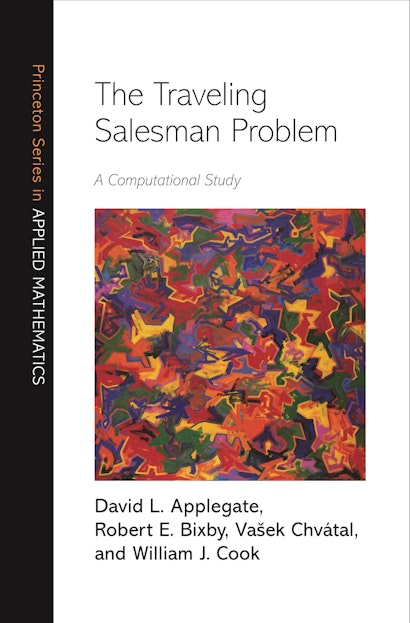This book presents the latest findings on one of the most intensely investigated subjects in computational mathematics—the traveling salesman problem. It sounds simple enough: given a set of cities and the cost of travel between each pair of them, the problem challenges you to find the cheapest route by which to visit all the cities and return home to where you began. Though seemingly modest, this exercise has inspired studies by mathematicians, chemists, and physicists. Teachers use it in the classroom. It has practical applications in genetics, telecommunications, and neuroscience.
The authors of this book are the same pioneers who for nearly two decades have led the investigation into the traveling salesman problem. They have derived solutions to almost eighty-six thousand cities, yet a general solution to the problem has yet to be discovered. Here they describe the method and computer code they used to solve a broad range of large-scale problems, and along the way they demonstrate the interplay of applied mathematics with increasingly powerful computing platforms. They also give the fascinating history of the problem—how it developed, and why it continues to intrigue us.
Awards and Recognition
- Winner of the 2007 Lanchester Prize, Informs
David L. Applegate is a researcher at AT&T Labs. Robert E. Bixby is Research Professor of Management and Noah Harding Professor of Computational and Applied Mathematics at Rice University. Vasek Chvátal is Canada Research Chair in Combinatorial Optimization at Concordia University. William J. Cook is Chandler Family Chair in Industrial and Systems Engineering at the Georgia Institute of Technology.
"The authors have done a wonderful job of explaining how they developed new techniques in response to the challenges posed by ever larger instances of the Traveling Salesman Problem."—MAA Online
"By bringing together the best work from a wide array of researchers, advancing the field where needed, describing their findings in a book, and implementing everything in an extremely well-written computer program, the authors show how research in computational combinatorial optimization should be done."—Michael Trick, Operations Research Letters
"The book is certainly a must for every researcher in practical TSP-computation."—Ulrich Faigle, Mathematical Reviews
"It is very well written and clearly structured. Many examples are provided, which help the reader to better understand the presented results. The authors succeed in describing the TSP problem, beginning with its history, and the first approaches, and ending with the state of the art."—Stefan Nickel, Zentralblatt MATH
"[T]the text read[s] more like a best-seller than a tome of mathematics. . . . The resulting book provides not only a map for understanding TSP computation, but should be the starting point for anyone interested in launching a computational assault on any combinatorial optimization problem."—Jan Karel Lenstra, SIAM Review
"[T]he book provides a comprehensive treatment of the traveling salesman problem and I highly recommend it not only to specialists in the area but to anyone interested in combinatorial optimization."—EMS Newsletter
"This book addresses one of the most famous and important combinatorial-optimization problems—the traveling salesman problem. It is very well written, with a vivid style that captures the reader's attention. Many examples are provided that are very useful to motivate and help the reader to better understand the results presented in the book."—Matteo Fischetti, University of Padova
"This is a fantastic book. Ever since the early days of discrete optimization, the traveling salesman problem has served as the model for computationally hard problems. The authors are main players in this area who forged a team in 1988 to push the frontiers on how good we are in solving hard and large traveling salesman problems. Now they lay out their views, experience, and findings in this book."—Bert Gerards, Centrum voor Wiskunde en Informatica


